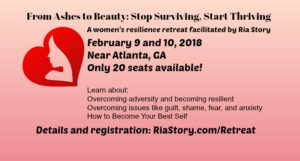Secretly, I’ve always wanted to be a superhero. Superheros are tough. They are brave. They are strong. I always wanted to be tough, brave, and strong, but for a many years I wasn’t. Growing up as a child sexual abuse victim, I felt small, insignificant, weak, and vulnerable. I felt like a victim. In truth, I was.
But, one day I realized the only one who could help me become a victor instead of a victim was – me. I learned how to unleash my inner superhero and overcome adversity in life. Although I couldn’t articulate this until many years after leaving my parents’ home, I would like to share with you the steps that have allowed me to unleash my inner superhero and overcome adversity in my life, both past and present. They worked for me then, and they work for me every day now. They will work for you too. They form the acronym “RISE.”
RISE: Respond Proactively, Identify Accurately, Step Forward Consistently, and Experience Joy.
Note: This is an excerpt of Ria’s new book, Bridges out of the Past, and is the first article of a four-part series on Resilience.
The first step is to “Respond Proactively.”
The dictionary defines “proactive” as an adjective meaning, “Serving to prepare for, intervene in, or control an expected occurrence or situation, especially a negative or difficult one; anticipatory.” Stephen R. Covey defined proactive as “choosing the response you will have to any stimulus.” To be proactive, you choose your response to any situation or stimulus in life, expected or not. If you fail to choose, a choice in itself, you will become reactive to the stimulus and simply respond based on the emotions of the moment.
As Scott Peck said, “…There are indeed oppressive forces at work within the world. We have, however, the freedom to choose every step of the way the manner in which we are going to respond to and deal with these forces.”
For me, responding proactively to the past and to the present requires two different approaches:
R – Respond Proactively: To Past Circumstances
Proactive and reactive people alike are affected by what happens in life. However, proactive people choose how they are affected by what happens. They choose how the little things and the big things that have happened to them during their life will affect them.
We have the ability and the responsibility to look back at a situation or something that has happened in our lives, to reflect on it, and to consciously choose how to view the experience. We will choose to respond either positively or negatively.
Proactive people always choose to discover, uncover, and leverage the positive in any situation. Regardless of how painful, difficult, hard, or awful the experience may have been, proactive people always make a decision to view it in a positive light.
To a reactive person, this seems counterintuitive. “There is no way I can view the death of my child as something positive,” a grieving mother may think. Yet, I know one such mother who did exactly that. In doing so, she has given additional meaning to her daughter’s life by turning the story of her battle with cancer into an incredibly inspiring book that delivers hope to many others.
Those who don’t understand the concept of being proactive often say to me, “How can you view what your father did to you in a positive way? There is no way I could view seven years of horrible sexual and psychological abuse as something positive.”
I simply choose to apply the principle of being proactive. I choose to view the negative things that happened in a positive way. My father controlled me and abused me physically and emotionally for years, but he cannot, and never could, control my freedom to choose how it affected me. Therefore, I choose to be better because of it instead of bitter about it. My past doesn’t define the woman I am today. Only I can do that. Your past doesn’t define you either. Only you can do that.
R – Respond Proactively: To Present Circumstances
For me, responding proactively to present stimulus and circumstances is more of a challenge because I don’t have the time to reflect, think, and carefully decide how it is affecting me. Many things that happen in life require an instant response, or lack of response, in the moment. It often feels more emotional because it feels more immediate.
Responding proactively in the moment means you realize you can’t control everything that is happening or that is about to happen. But, you can always control your response to what has just happened or what is still happening.
When you don’t like what has happened, you can choose your attitude and response to the situation and your circumstances. I’m training for a marathon and had a nine mile training run scheduled for this morning. When I awoke, it was raining and continued to drizzle rain most of the morning which made my nine mile run very uncomfortable. In fact, the conditions were downright miserable. I couldn’t control the conditions. But, I could control my response to the conditions. So, I ran anyway. With soggy shoes, wet clothes, and a smile. External circumstances do not dictate how I feel inside. Only I can do that. Proactive people carry their weather within.
When someone says something you don’t like, you have the freedom to choose to respond reactively from a position of anger or hurt in the moment. Most often, we end up regretting these emotionally charged responses later.
However, you also have the freedom to choose to respond to the same situation in a careful and intentional proactive way that allows you to harness and suppress the emotion of the moment. Responding without being angry or hurt allows you to respond based on the values you truly care about. Most often, choosing a proactive response based on internalized values produces a far better outcome than choosing a reactive response that is based on your feelings and the emotions of the moment.
Responding proactively means you maintain control in spite of your feelings. Other people cannot dictate how you feel on the inside. They can’t make you hurt, upset, frustrated, mad, or sad. They can’t make you happy, joyful, excited, or delighted. You are the only one who can determine how you feel on the inside. If you don’t choose to become responsible, you have chosen to be irresponsible.
Dr. Edith Eger stated, “Our painful experiences aren’t a liability, they’re a gift. They give us perspective and meaning, an opportunity to find our unique purpose and our strength.” It is not what happens to us that determines how we feel. The things that happen to us only influence us. They do not determine us. It is our response to what happens to us that determines how we feel. Things only become painful when we choose to see them in a painful, reactive way.
Much like you must continually exercise to maintain your physical health, you must also continually practice being proactive to maintain positive mental health. Choosing to be proactive isn’t always easy. However, it is always worth it. The more you choose to be proactive, the easier it becomes to be proactive.
Perhaps, you may eventually master the art of becoming proactive to all situations and to every stimulus in life. It’s possible. I haven’t arrived yet, but I work to improve and strengthen my proactive “mind muscles” every day.
Sonya Friedman said it best, “You have control over three things: what you think, what you say, and how you behave. To make a change in your life, you must recognize these gifts are the most powerful tools you possess in shaping the form of your life.”

